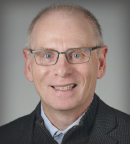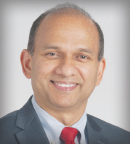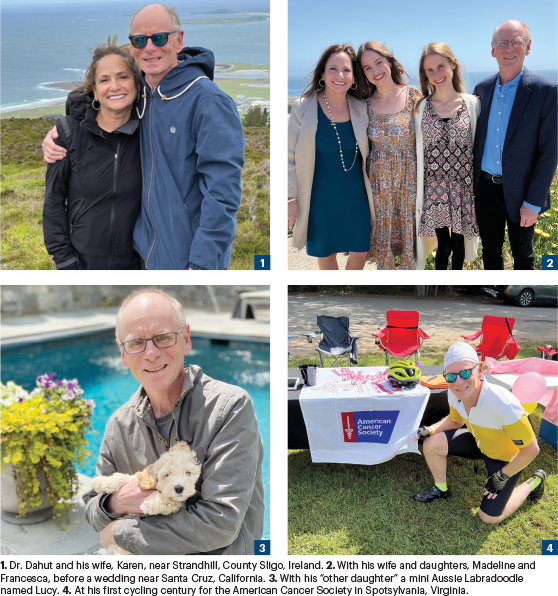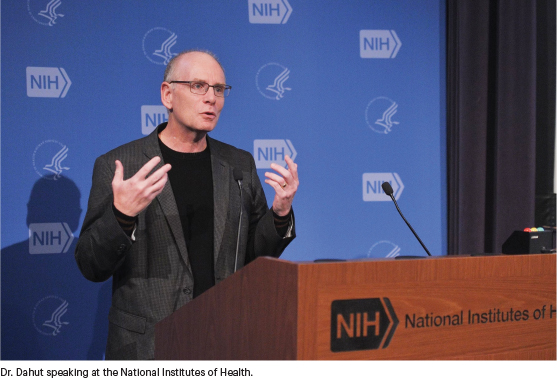In this installment of the Living a Full Life series, Guest Editor Jame Abraham, MD, FACP, spoke with William L. Dahut, MD, who is currently serving as Chief Scientific Officer for the American Cancer Society (ACS). In this role, Dr. Dahut manages all pieces of the organization’s discovery work, including surveillance and health equity science, population science, cancer screening guidelines, and extramural discovery science. He serves as the scientific voice of the organization, advises key discovery positions, and manages more than $400 million in research funding. Before joining the American Cancer Society, Dr. Dahut held leading roles at the National Cancer Institute (NCI), where he served as Scientific Director for Clinical Research at the NCI’s Center for Cancer Research.
WILLIAM L. DAHUT, MD

On his return to the NCI: “The main reason was that it simply was a great time to be a clinical investigator working on prostate cancer. The position at NCI afforded me lots of opportunity to treat patients along the full spectrum for prostate cancer.”
On the ACS’s internship program: “We plan to expand it from 1 to 3 years, with space for up to 120 new interns. It’s truly exciting to be part of something that has the potential to energize the cancer care system with enthusiastic young oncologists.”
Advice for the next generation of fellows: “I think one needs to be open to opportunities as they arise.... Being open to change and serendipitous opportunity is important for career growth.”
Dr. Dahut was reared in a suburb on the outskirts of Washington, DC. During his youth, he was active in sports, and, perhaps due to the proximity to the Capital City, he briefly flirted with the idea of a political career. “I grew up one of three children. My father was an executive with the telephone company, and my mother was pretty much a stay-at-home mom, although she did have some various jobs when I was growing up. I loved science, but early on, my only reference point to medicine was the family pediatrician,” he shared.
Dr. Dahut attended Georgetown Prep, a Jesuit college preparatory school in North Bethesda, Maryland, for boys in the ninth through twelfth grades. After graduating high school, Dr. Dahut entered Georgetown University as a psychology major.
“I took a lot of history classes, and really the bare minimum number of sciences to be pre-med eligible. I did crew my first year and played football for 3 years. It was a Division III program; we were playing schools like Johns Hopkins, and it was very low key and actually easier than high school. I scored some points and stuff, but the NFL wasn’t scouting me, let’s put it that way,” said Dr. Dahut.
Introduction to Oncology
After graduating from Georgetown Prep, Dr. Dahut entered Georgetown University Medical School. During his first year, he was assigned to a preceptorship, which is a mentoring experience in which a practicing physician volunteers to give personal instruction, training, and supervision to a medical student during the first 2 years of medical school.
“One of my precept mentors was a faculty member named Fred Smith, MD, who began talking about oncology; to be perfectly honest, this was back in the 80s, and I had no idea what oncology was all about. So, I got out the Stedman’s Medical Terminology book my uncle had given me as a graduation gift and looked up oncology, discovering that it was the study of malignant tumors, which I thought sounded interesting. Dr. Smith showed me how to palpate tumors, and some other stuff that increased my interest in oncology,” he added.
Dr. Dahut continued: “At that time, a lot of our class at Georgetown had the military pay for medical school, because Georgetown’s tuition had jumped significantly, and it was one of the most expensive schools in the country. Thus, I was required to apply for training in the Navy and did my general medical internship down at Portsmouth Naval Hospital, followed by 2 years in the ER at Camp Lejeune. The best part of that service was it was where I met my future wife. After my 2-year stint at Camp Lejeune, I went to the NCI, which then had a branch in Bethesda, and finished my residency,” he recalled.
GUEST EDITOR

Jame Abraham, MD, FACP
Dr. Abraham is Chairman of the Department of Hematology and Medical Oncology at Cleveland Clinic and Professor of Medicine at Lerner College of Medicine.
At the NCI, Dr. Dahut was exposed to, among other things, a world-class lung cancer team that had come from the VA Hospital in Washington, DC, notably Drs. John Minna and James Mulshine, a period during which exposure to the NCI staff helped mature his budding career. “I did my residency that was paid for by the Navy in a hospital that had an NCI floor, which was a pretty good thing. And there were multiple incidences that really informed my appreciation for medicine. For instance, when I was a medical resident, Otis Brawley was a first-year fellow; one night, during a power outage, we had to perform CPR on this poor old lady. It was high medical drama, but things like that happened, and the hands-on experience certainly fortified my grip on medicine. However, it was the exposure to research as a resident that solidified my interest in oncology,” said Dr. Dahut.
When Dr. Dahut began his fellowship, he was still in the Navy program, and when the first Gulf War broke out, he was fully integrated into the NCI program. “I really enjoyed the intensive experience at NCI, working with doctors like Mike Kelly, Chris Takimoto, Carmen Allegra, and Bruce Johnson. I was lucky to have those opportunities, and although I enjoyed the lab, I realized it wasn’t as rewarding to me as patient care in the clinic. That’s why I always advise people not to get locked into something before you’re sure it’s what truly excites you. It takes serious introspection, but once you find your passion, follow it, and you’ll never regret it,” said Dr. Dahut.
Becoming a Prostate Cancer Specialist
Dr. Dahut completed his fellowship in hematology and medical oncology at the Bethesda Naval Hospital and the NCI Medicine Branch. He then worked as an attending physician in the NCI–Navy Medical Oncology Branch until 1995, when he joined the faculty of the Lombardi Cancer Center at Georgetown University.
“I was recruited to Georgetown to work on lung cancer and replace a person who was supposed to leave, but after I’d already committed to Georgetown, he decided not to leave. So, one of the department heads asked me if I’d like to do prostate cancer instead, so I figured how hard could prostate cancer be and took on the position. I went to Georgetown and was there for a couple of years doing prostate cancer. It was a good experience, and I really liked Georgetown, but I had an opportunity to return to the NCI to lead the clinic as a tenure track. And not having to move to a distant location, added to the package, so I accepted the job at NCI, and it proved to be a great career move,” said Dr. Dahut.
Asked to elaborate on his decision to return to NCI, Dr. Dahut replied: “The main reason was that it simply was a great time to be a clinical investigator working on prostate cancer. There had been an earlier period when most folks in medical oncology didn’t think there was a role for medical oncologists in prostate cancer, as most care was done by the urologist. And it had been largely only hormone therapy or early hormone therapy. However, patients develop what we used to call hormone-refractory prostate cancer, and there were no options except palliation. So, the position at NCI afforded me lots of opportunity to treat patients along the full spectrum for prostate cancer. Moreover, we also had that group of patients we now called biochemically recurrent, and we were looking at combining vaccines or angiogenesis inhibitors for that group and we accrued lots of patients to studies. It was very interesting work.”
Dr. Dahut returned to the NCI in 1998, where he served as Scientific Director for Clinical Research at the NCI’s Center for Cancer Research, Head of the agency’s Prostate Cancer Clinical Research Section, and NCI Clinical Director. Dr. Dahut led the revitalization of NCI’s clinical research program, growing the number and caliber of senior, tenure-track, and physician-scientist early investigators and staff clinicians, reorganizing clinical research, and increasing regulatory support and facilities for cell therapies.
Joining the American Cancer Society: A Vision Forward
In May of this year, after a long and notable career at NCI, Dr. Dahut was named Chief Scientific Officer for the American Cancer Society. He oversees the strategic direction of intramural and extramural research and manages all pieces of the Discovery Pillar, including surveillance and health equity science, population science, cancer screening guidelines, and extramural discovery science.
Asked to describe the goals of the American Cancer Society, Dr. Dahut responded. “The ACS has been around for more than 100 years. During that time, the leadership has truly learned how to evaluate the public health impact of cancer on multiple levels and how to translate that knowledge into action. Reaching back to the 1950s, ACS cohort studies were -instrumental in -changing public perception about cigarette smoking. So, although there are multiple historic inflection points in the ACS’s role in cancer research, prevention, and cure, it’s an organic organization that uses its strategic leverage to effect positive change in the ongoing struggle to reduce the mortality and morbidity of cancer.”

Dr. Dahut continued: “An area that resonates with me and is finding ways to encourage more funding directed at preventive screening is early detection. Naturally, as oncologists, we’d much rather treat patients when they have a small amount of disease before it spreads. Even though we’ve made great strides in treatment, with targeted therapies and immunotherapy, there needs to be more attention paid to prevention.”
Another goal of the American Cancer Society, Dr. Dahut mentioned, is to help fund the pipeline of bright young residents and oncology fellows, “so we can continue to build on our current advances. To that end, we have several programs in the works, such as an internship program; we are planning to expand it from 1 to 3 years, with space for up to 120 new interns. It’s truly exciting to be part of something that has the potential to energize the cancer care system with enthusiastic young oncologists. They not only reflect the population of scientists, but the population of the country at large. Along with that initiative, the ACS is moving forward with programs to help ease the inequity and lack of diversity in the oncology workforce.”
Dr. Dahut continued: “I want to pull together a community of scientists who collaborate in a way that will really change cancer. And I think it can be done. As previously mentioned, I want to change the way we detect, diagnose, and prevent cancer; in doing that, we can also change the way scientists think about cancer. So, in the coming years, we will see advances that will change the landscape of cancer care across the country. It sounds like a grand scheme, but I’m confident it can be done.”
Advice for the Next Generation
Dr. Abraham asked Dr. Dahut to share a bit of hard-won advice for oncology fellows just entering the field. “When I started on a tenure track, the general consensus was to be focused; that was the operative word of advice,” Dr. Dahut commented. “But as important as focus is, I think one needs to be open to opportunities as they arise, provided you can manage them within your life. For example, I was supposed to do lung cancer at Georgetown, and then Mark Lipman called and asked if I would like to do prostate cancer. I thought about it and realized it was a real opportunity. And I liked the patient population and the evolving science, so being open to change and serendipitous opportunity is important for career growth.”


Dr. Dahut continued: “You’re going to meet people; you’re going to learn things, some of which you hate, and that might be a good part of your overall experience. It’s vital to understand from the beginning that we are at work a lot of the time, and it’s hard work, so to thrive in this career, you need to constantly find ways to make it fun and exciting. Given what we do, oncologists must be optimistic by nature. But still, I would encourage young people in this field to help create an environment that is based on unity and collaboration, one where people are recognized for their hard work. Do what’s best for the institution, not just yourself, and in the end, your career will be more rewarding. This is the most exciting time ever for oncology. And being part of it is special.’”
On the Lighter Side
How does a super-busy oncology leader decompress? “During the early part of my career, I was at lots of soccer games and swimming matches with my daughters, which was great. Now, I do a lot of cycling, which I guess is my golf equivalent. I’ve been cycling with the same guys for about 20 years. I also like to travel. Given that a lot of my friends have kids who are getting married, I travel to their weddings. So, over the past 6 months, we had a wedding in St. Andrew, Scotland, one in Tuscany, one in Bloomfield Hills, one in Santa Cruz, one in Annapolis, Maryland, and one in DC. It’s a lot of fun. I also walk my little Labradoodle around the neighborhood, which is a terrific way to decompress.
DISCLOSURE: Dr. Dahut reported no conflicts of interest.

